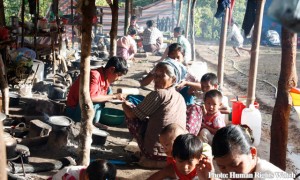Humanitarian Aid Denied
By Burma Partnership • February 11, 2013 This week’s ceasefire talks between the Kachin Independence Army (KIA) and the Burma Government are a positive step in what has been a devastating conflict rife with human rights abuses, displacement and death. While these talks have been praised by both international governments and the United Nations, there remain many obstacles to a sustainable political settlement and lasting peace.
This week’s ceasefire talks between the Kachin Independence Army (KIA) and the Burma Government are a positive step in what has been a devastating conflict rife with human rights abuses, displacement and death. While these talks have been praised by both international governments and the United Nations, there remain many obstacles to a sustainable political settlement and lasting peace.
Hostilities are still occurring and combatants continue to resupply, increasing tensions in an already frail situation. One positive step that has been taken is the allowance of aid to those in KIA-held areas affected by the conflict. Though it should be stated that the size and scope of this aid needs to conform to the needs identified on the ground and if all of those affected will receive adequate help is yet to be determined. It is estimated that over 160,000 people have been displaced over the course of fighting. These people are living in makeshift camps and without emergency aid are at great risk of humanitarian tragedy.
Sadly the same concern for the wellbeing of men, women and children is not present in other areas affected by conflict in Arakan State. Doctors Without Borders has warned that without effective and immediate access to aid, displaced people in Arakan State face a “humanitarian emergency.” In a statement they highlight the “tens of thousands of people” who still lack access to “urgently needed medical care.” People are cut off from medical care, lack clean water and basic provisions, seen in the increase in child malnourishment.
In the face of these glaring basic human needs there has been difficulty in getting help to those affected. The issue is not formal access by those trying to deliver aid and medical attention but more informal resistance. Doctors Without Borders General Director Arjan Hehenkamp states that, “Ongoing insecurity and repeated threats and intimidation by a small but vocal group within the Rakhine community have severely impacted on our ability to deliver lifesaving medical care.” For example, clean water is available but displaced people are not able to access it fearful of violence if they do.
These conditions drive some displaced people to attempt to flee to Thailand by boat. It is estimated that over 6,000 people have entered Thailand by boat since the violence started in June of last year. The Thai government has recently implemented a policy where boats with “Rohingya boat people” will not be allowed to land and will be sent back to sea. At the same time, there have been accusations and an investigation into high-ranking Thai army officers engaging in human trafficking of Rohingya who have already landed in Thailand.
We urge that all necessary humanitarian aid be given to those in need and current obstacles be removed. Absent medical aid, access to clean water and malnutrition are just as effective in killing a human being as a bullet or a landmine. A difference being that one disproportionally affects the most venerable parts of a population and is easily preventable.
Tags: Ceasefire, Humanitarian Assistance, Internally Displaced People, Kachin StateThis post is in: Blog
Related PostsNew report by Network for Human Rights Documentation – Burma Details Continuing Human Rights Violations by Burmese Military against its Citizens
Burma Army Kill Villager in Front of His Parents, then Force over 1,200 Villagers to Demonstrate Against “Insurgents” for Killing Civilians in Murng Yawng
Protection and Security Concerns in South East Burma/ Myanmar
အမ်ဳိးသားဒီမိုကေရစီအဖြဲ႔ခ်ဳပ္ တည္ေထာင္ျခင္း (၂၆)ႏွစ္ေျမာက္ ႏွစ္ပတ္လည္ေန႔ ေၾကညာခ်က္အမွတ္-၁၀ / ၀၉ / ၂၀၁၄
What Refugees Say…









 All posts
All posts